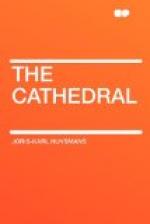And what, after all, were these trifles, these minor details in the splendid completeness of the cloister? What were these petty matters—mere nothings—in the scale as against peace, the cheerfulness of the soul in the joy of the services and the fulfilment of the task of praise? Would not the tide of worship cleanse everything, and wash away the small defects of men, like straws in a stream? Was it not the case of the mote and the beam, with the parts reversed—imperfections discerned in others, when he was so far their inferior?
“Constantly, at the end of every argument, I find my own lack of humility,” said he to himself. “What efforts are needed to remove the mire of my sins! In a convent perhaps I might rub the rust off,” and he dreamed of a purer life, a soul soaked in prayer, expanding in communion with Christ, who might perhaps, without too much soiling Himself, come down to dwell in him. “It is the only life desirable,” cried he. “It is settled!”
But then, like a douche of cold water, a reflection overwhelmed him. It would in any case be the life in common, school-life, which would begin again for him; it would be the garrison-rule of a convent!
This floored him. Then he tried to fight against it, and lost patience.
“Come, come!” he growled, “a man does not shut himself up in an abbey to take his ease there; a convent is not a pious Sainte-Perine; he retires there, I suppose, to expiate his sins and prepare for death. What, then, is the use of expatiating on the kind of punishments to be endured? A determination to accept them is all, to endure them and be strong!”
Did he, then, sincerely long for suffering and penance? He dared not answer himself. In the depth of his soul a hesitating “Yes” rose up, smothered at once by the clamour of cowardice and fear. Why then go?
He was only bewildering himself, and when the worst of this turmoil was over he thought of a respite, or of some half-measure, some mild mortification quite endurable, some repentance so slight as to be none at all.
“I am an idiot,” he concluded; “I am fighting with the air; I am puzzling myself with words, about habits of which I have no knowledge. The first thing to be done is to visit some Benedictine monastery—nay, several—to compare them, and to see for myself what the life is that is led there. Then the matter as to the oblates must be cleared up; if the Abbe Plomb is well informed, their fate depends on the caprice of the Abbot, who can tighten or loosen the halter according to his more or less domineering character. But is that quite certain? There were always oblates throughout the Middle Ages; consequently they are controlled by the secular law!
“And all this is so human, so vile! For it is not a matter of disputing texts and more or less accommodating clauses. It is a case of subjection without reserve, of leaping boldly into the water; of giving oneself up entirely to God. Any other view of the cloister is to regard it as a citizen’s home, and that is absurd. My apprehensions, my antagonism, my compromises, are disgraceful!




